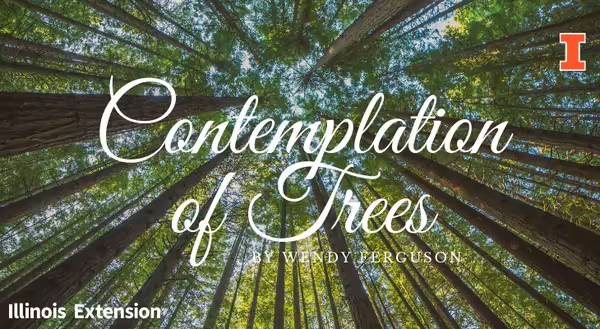
Sitting in the woods, I hear the sound of fall through the voice of the trees. Trees talk in swooshes, crackles and this time of year in a rustle. One only has to hear this distinctive sound to know the seasons have truly changed. As Walt Whitman wrote, “Go and sit in a grove or woods, with one or more of those voiceless companions, and read the foregoing, and think.” So as I sit here listening to fall, I contemplate the trees.
I am not the first nor will I be the last person to do so. Trees have been the subject for many an artist, poet and philosopher. Nor is it the first time I myself have pondered them. What is it about trees that speak to us?
Since the dawn of human time, trees, the oldest living things on earth have been our faithful, silent companions (Bristlecone Pine (Pinus longaeva) measured to be 5,065 years old). Perhaps this is why there seems to be a wisdom waiting to be learn by their study. In a discussion with a friend, we talked about how trees can be a metaphor for raising children. The need for a good foundation, how if we “stake” a tree and never take those stakes off, the tree will never stand on its’ own and how there is always the striving pushing upward toward something yet unseen.
But regardless of whether you believe they are speaking to us on a spiritual level, they are amazing entities all by themselves. Not only do they make oxygen, the very stuff we humans need to live, they provide us with food and shelter. And we are not the only ones who benefit from their presence. An oak tree alone can provide for hundreds if not thousands of species. One study called the Protect Oak Ecosystems found that over 2,300 species of invertebrates, birds, mammals and fungi depend upon the oaks. The study did not include bacteria or microorganisms, so the real number is likely to be much greater.
For me, that makes the idea of connection and community all the more striking. Trees are a reminder that we all have our spot in the world. They don’t worry if they are too tall or their leaves are the wrong shape. They just are and the community accepts them as they are. So what if we could take a lesson from the trees? What if we could acknowledge and accept our unique gifts and accept the fact that others have their own unique gifts and we all used those gifts in the service of others, just like the trees? Just imagine what our communities could be…